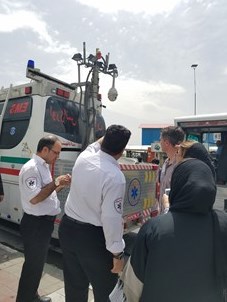 8 March 2017 – A mission was conducted by WHO technical teams in Islamic Republic of Iran from 22 to 27 April 2017 to assess and assist the country’s emergency medical team system with the purpose of strengthening the response capacity across all-hazard emergencies. The mission brought together different stakeholders to discuss the most updated global practices and mechanisms. The current level of capacity of mobilization and deployment was assessed and a roadmap developed to ensure that emergency medical teams get eventually classified by WHO to have reached global practice standards. In addition, areas related to safe hospitals, mass gatherings, chemical and biological preparedness were also discussed during the mission in the pursuit of emergency preparedness and response.
8 March 2017 – A mission was conducted by WHO technical teams in Islamic Republic of Iran from 22 to 27 April 2017 to assess and assist the country’s emergency medical team system with the purpose of strengthening the response capacity across all-hazard emergencies. The mission brought together different stakeholders to discuss the most updated global practices and mechanisms. The current level of capacity of mobilization and deployment was assessed and a roadmap developed to ensure that emergency medical teams get eventually classified by WHO to have reached global practice standards. In addition, areas related to safe hospitals, mass gatherings, chemical and biological preparedness were also discussed during the mission in the pursuit of emergency preparedness and response.
The mission reviewed the emergency medical system of different stakeholders, particularly the Ministry of Health and Medical Education and the Iranian Red Crescent Society, and discussed the scope for further development within the spectrum of emergency response mechanism of the country. The mission also discussed the optimum linkages of emergency medical system to the country’s existing national response mechanisms, including national emergency response framework.
“Islamic Republic of Iran has substantial capacity in the form of emergency medical teams with a pool of volunteers already trained by the Ministry and IRCS. We also see expanding logistic capacities in the country which is paramount for achieving the level of self-sufficiency needed in emergencies. This mission also helped us learn about the recent experiences in order to understand the systems and capacity of the country,” said Dr Ian Norton, Manager of the WHO Emergency Medical Teams Initiative.
During the discussion with the Ministry and other stakeholders at the workshop, Dr Qudsia Huda, Team Lead for the Preparedness, Readiness and Capacity Building at the Regional Office, highlighted the need for revision of the current emergency preparedness and response plan of the country taking into consideration the recommendations of the mission that will ensure standardized sustainable capacity development for emergency response in order to reduce the health risks in communities. "This capacity also can be used in neighbouring countries within the auspices of IHR implementation," she added.
Islamic Republic of Iran experiences both natural and man-made events. Since the devastating Bam earthquake, the country has moved forward substantially in developing the national capacities for all hazard emergency response with a sustainable risk management approach.The emergency medical system has been institutionalized in the Ministry with the involvement of other key health sector partners including the IRCS. The emergency medical system is still a growing system to reach out to the communities in different provinces prone to different types of hazards.
Speaking at the concluding session of the workshop, Dr Sameen Siddiqi, WHO Representative, reiterated the need for a coordinated inter-agency approach to health emergency response operations under the leadership of the Ministry. He further highlighted the need to map the emergency medical team in the country and develop training programmes that are tailored to their needs. Dr Siddiqi also stated that “WHO within the scope of its recent reform will be able to provide the support required to implement the priority activities to strengthen the emergency medical team system in the country”.








